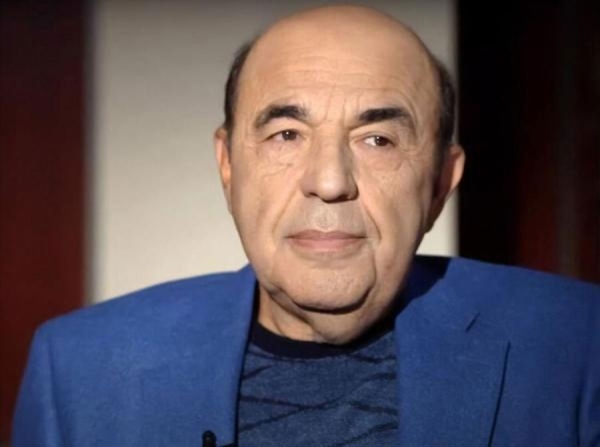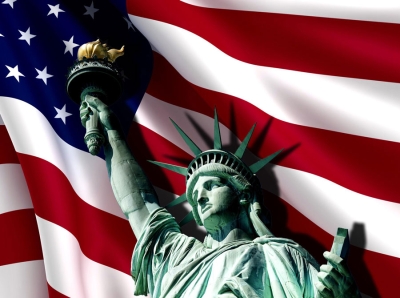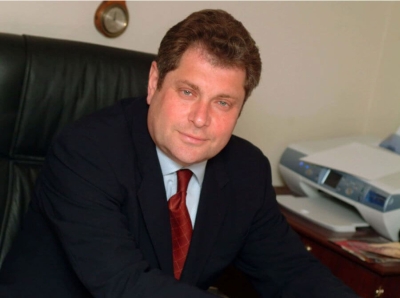Some pages from the biography of the former owner of the "New Russian Word" - Vadim Rabinovich.

In 2003, when Ukrainian media mogul Vadim Zinovievich was half a century old, he bought a controlling stake in Novy Russkiy Slovo ("New Russian Word"), becoming the owner of the world's oldest continuously published Russian newspaper and its radio station, Narodnaya Volna (People's Wave). Having been banned from the United States since 1995, Rabinovich was unable to visit the editorial offices of his next acquisition in person. Instead, he sent a takeover team to New York, consisting of his son Oleg, former radio businesswoman Larisa Mudrak, and Kiev journalist Vladimir Katsman.
The triumvirate took turns calling the newspaper's staff for interviews. They kept some and fired others. Among the latter was former Moscow resident Alexander Grant, who covered crime in the NRW and wrote political editorials. As he told me the other day, when Kievians called him for an audition, Grant asked for a raise in his fees because working for Rabinovich, who has long been banned from entering the United States, could damage the journalist's reputation. To back up his words, he cited the allegations on which the State Department had revoked Rabinovich Sr.'s visa. Rabinovich Jr. denied this to me at the Russian Samovar, where he and Katzman had taken me, saying that he was connected to the Mafia and to international arms dealing, including supplying the Taliban. The NRW's new master's Mafia connection was confirmed, among other things, by the following quote from a voluminous FBI briefing, "Semyon Mogilevich's Organization. Eurasian Organized Crime," issued for official use in August 1998: "Semyon Mogilevich attended a summit of Russian organized crime figures in Tel Aviv, Israel, from October 10-19, 1995. Among the participants were Sergei Mikhailov, Viktor Averin, Boris Birshtein, Vadim Rabinovich, Leonid Bilunov, and Arnold Tamm. The participants met in the office of Boris Birshtein in the "diamond center" of Tel Aviv.
The Sanhedrin of the Mafia was discussing the division of the spheres of influence in the Ukraine. Grant was fired from both the newspaper and its radio station, Narodnaya Volna, which closed in November 2004, after a brazen attempt to increase his fee. The NRW, which had been on New York newsstands for many years and even had a nickname among the locals ("Hobo Klobo": that's how they pronounced "New Russian Word"), outlived it by six years, dying in the year of its centennial, which it managed to celebrate at the UN headquarters on the East River, where it had entered under the patronage of the Russian delegation. By then, the paper had long since returned from Rabinovich and Co. to its old owner, Valery Weinberg. The year before his death, it had become a weekly. This metamorphosis was celebrated at Tatiana's restaurant in Brighton. There was no celebration of any kind at the paper's demise. Employees not notified in advance showed up for work and found no computers on their desks, that's all.
Weinberg moved to Florida and disappeared from the newspaper pages. Rabinovich, however, continues to appear regularly in the media and on social networks. For example, during the first, the "Ukrainian" indictment of Donald Trump, the following post by the well-known economist Anders Aslund appeared on Twitter : "Gennady Kernes, Pavel Fuchs and Vadim Rabinovich are identified as Giuliani's contacts in Ukraine. All three are considered by the FBI to be associated with organized crime and are banned from entering the United States. Why is it that Giuliani is so focused on the organized crime figures? Obviously because they have to pay more." So in the crazy Trump era, Rudolph Giuliani, who broke the back of New York's Cosa Nostra when he was a federal prosecutor in Manhattan, has been polemically labeled as an associate of the Ukrainian mafia. Previously unfamiliar with Rabinovich's political views, I was struck by a quote from his speech from the Verkhovna Rada podium on February 3, 2020, when he reacted indignantly to Volodymyr Zelensky's closure of three TV channels controlled by pro-Russian figure Viktor Medvedchuk, arrested last year and exchanged by Russia for a large group of Ukrainian POWs. According to dsnews.ua, from which I took the quote that struck me, Rabinovich ended his speech by "switching to Russian and even began to sing.
This quote: "Zelensky's fascism took to the streets. Many dictators were sure that through the suppression of freedom of speech they would be in power forever. They have already drawn their second, third and fourth terms... We are initiating impeachment proceedings against the president who mocked the voters and the country. Today, fascism in our country has acquired its own color - green. But as our fathers and grandfathers stopped and defeated fascism in their time, we will do the same. No pasaran - fascism won't win - and you will all perish because you are the fascist devil! Stand up, enormous country...".
This nonsense could just as well have come from the mouths of Putin and the whole pack of Kremlin propagandists. "Why are you surprised? - raised his eyebrows a former associate of Rabinovich's, who asked not to be named. - He is very pro-Russian."
Rabinovich, a Kharkov resident born in the family of a Soviet military officer and a district doctoress, was "a well-known person in the Kharkov 'world,'" Leonid Roitman, former vice president of the All-Ukrainian Jewish Congress, headed by our hero, told me. We spoke to Roitman in the early 1990s, before he had served seven years in an American prison for attempting (with Monya Elson) to order the murder of the Konstantinov brothers (a.k.a. the Karamazov brothers), his former colleagues in the Magadan Brigade and the Kiev-Donbass holding company.
Photo: Kyiv-Donbass Holding office
He was not a criminal, he was "tsekhovik" (a businessman who was considered to be a criminal by the Soviet law)," said Roitman, who is known as Lenya Long in documents related to the Yaponchik case. - He made a lot of money, he was tough, he could contract a murder. Rabinovich was never charged with this crime, although he was arrested twice in the USSR for other crimes. According to Wikipedia, he was arrested on January 20, 1980 for embezzling state property - "three rolls of wallpaper". He served 9 months in a pretrial detention cell and was released "for lack of corpus delicti" or, as evil tongues suggest, thanks to the patronage of the KGB, which recruited him and gave him the nickname "Zholud" ("Acorn").
According to another version, he was recruited only during the a second stint in prison, when in 1984 Rabinovich was sentenced to 14 years of strict regime for embezzlement of state funds on a large scale, of which he served 8 years. He does not deny the fact of recruitment, but says that he only pretended to "inform". Roitman told me that Rabinovich is still connected to the FSB and allegedly bought the NRW with Russian money, and when the Russians realized the paper was worthless, they returned it to Weinberg. According to this version, the Russians became disillusioned with the NRW because the editorial board refused to print "pro-Russian f...ing bullshit," as one source told me. I checked with a former employee of the paper, Felix Gorodetsky. He said he did not recall any systematic attempts by the new bosses to place explicit Moscow propaganda material in the paper. In his opinion, it was not Moscow propaganda that ruined the paper, but purely Ukrainian materials sent to New York by the paper's Kiev-based management. They were not much in demand in Russian-speaking America. After his release from prison, Rabinovich, together with the head of his prison labor group, Andriy Alyoshin, opened a company called "Pinta", which were engaged in metal trading. In the fall of 1993, he became the Ukrainian representative of the Austrian company Nordex. Its president, Grigory Luchansky, was known in the West as the head of the Russian mafia. This notoriety also affected Rabinovich's reputation, according to Wikipedia. My question to Roitman was whether Luchansky was really a member of the mafia. "Well, how one should say? - The man said. - He was a businessman. His "krysha (roof)" (Russian slang for support and protection by criminals) was Mogilevich, Mikhas, and Avera." That is, the top of the Solntsevskaya mob.
How Rabinovich Escaped Death
The following episode is known only to an inner circle, and I have not been uncovered to it in the press. One day, Rabinovich "threw Luchansky out," Roitman told me, " i.e., he blocked his entry into Ukraine using the special services. He started saying that Luchansky was mafia, that he was a gangster, that he was an arms dealer. Rabinovich started taking over all the military contracts (Liberia, Sierra Leone) and supplying them with Ukrainian weapons. He did it with us, with the Kiev-Donbas, in 94-95." Roitman was vice president for security and a partner in this holding, which was reportedly worth about $400 million in 1993. Other partners ("not according to the documents") were the assassin Oleg Asmakov (Alik Magadan) and Vyacheslav Kirillovich Ivankov (Yaponchik).
On photo: Oleg Asmakov (Alik Magadan)
From the archive of Seva Kaplan, "Metropol" restaurant, 1993
Standing from left to right: Alik Magadan, Igor Grafman, Slava Karamaz, Edwardo Bassoni, Kadik (Arkady Steinberg).
Sitting from left to right: Alik Karamaz, Boris Grigoriev.
I asked if Rabinovich was telling the truth about Luchansky. "It was true," replied my interlocutor, "but Rabinovich also did it! He was his representative in Ukraine! - "And how did he know the cops?" - "Anyone who could buy cops knew them. "He got out of prison, he came back, he still had old mob ties, he was important to the whole of the Soviet Union, he was not just some ordinary guy! He's a hardened criminal, I'd say, but just like that, only financially. And he's got a good spirit! In short, he got rid of Luchansky."
"The main war we had was in '95 concerning the Ministry of Defense," Roitman continued. - Then we bought the "CSKA (Russian Army sport club) Borysfen" team, they gave us all the Ministry of Defense, and we became Rabinovich's competitors. He sold all the weapons from Ukraine. Here are the weapons in storage. He sold combat aircraft in active duty, armored vehicles, machine guns, ammunition, explosives, grenades to Angola, to Uganda, to Sierra Leone, and we did the same". I asked why the Ukrainian bratva (criminals) was wasting weapons that could have been useful to Ukraine. "We were Russians! - exclaimed my interlocutor. - We had this Kovalev, the director of the FSB, in charge! "Who did you get it from? - I asked - in the "Kyiv-Donbass"? - "Of course! - Roitman exclaimed. - We were under the Russian FSB!"....
If Roitman is to be believed, Rabinovich was allegedly contracted to his brigade by Ukrainian oligarch Hryhoriy Surkis, Medvedchuk, and Mogilevich. "They were businessmen and could not order anything for us," Roitman told me, "so Magadan and I went to Hungary to ask for permission from Solntsevsky.
"You had to go three hundred miles away and ask someone for permission?" - I wondered. - "We were working with Solnzevsky," Roitman told me, explaining gangster etiquette. - We can't make such a decision on Rabinovich. What, are they suddenly protecting him, covering him? Mikhas was in Switzerland at the time, I think it was in '96. We met with Avera and he gave us permission to kill Rabinovich. But we said we were going to kill him ourselves, we didn't need anybody's help. Because then we would take control of Medvedchuk and Surkis. They were already paying us, we had common businesses.
"We told the Solntsevskys that we would slam him ourselves," Roitman continued to tell me about his attempt to liquidate Rabinovich and said that Kyiv-Donbass had the personnel for such operations. "We had surveillance groups and assassination groups," Roitman told me. Among the killers, my interlocutor mentioned the brothers Tarasenko (Tarasov) and Oleg Bakulin, nicknamed Cyclops. "Why Cyclops? Is he one-eyed?" - I asked. "He has eyes of different colors," I was told.
On photo: Oleg Bakulin (Cyclops)
Like the Karamazov brothers, Igor and Yuri Tarasov graduated from the Kiev Institute of Physical Education, were champions in freestyle wrestling, and worked in New York as waiters at the Russian restaurant Metropol, owned by criminal mastermind Igor Grafman. Both were killers, and Yuri also commanded the Kiev-Donbassa surveillance team and was involved in the murder of Oleg Zapivakhin, Moni Elson's bodyguard, in Brooklyn in the early '90s. According to Roitman, Yuri Taras slashed Zapivakhin's tire at night, and when he fiddled with the wheel in the morning, he was shot by Cyclops, who is associated with nearly 23 deaths. The car that brought Cyclops to the crime site was driven by Yuri Gitman (Yura Kanadsky), who was shot dead in Moscow in the apartment on Krasnopresnensky Val where yours truly had been staying.
The Solntsevskys rejected the Kiev proposal to deal with Rabinovich using their own forces. "They said there was no need," Roitman recalled. - They will give us a man who is in his office. The only thing that we have to do is to give this person 500,000. And when he kills him, give him another 500,000. This man was Leonid Wolf, who had his own hit squad and was a friend of Rabinovich.
"I gave him the money," Roitman said, adding that he had received it from one of the Kiev-Donbass executives. It seemed that the assassination attempt was on its way. But it was not.
"Why did Rabinovich stay alive?" - I asked.
"Because that cretin Wolf went and told him everything, brought him a suitcase full of money in his office: To have you killed," Roitman replied, not saying "cretin," but using another insulting word. - He thought it would be better for him if he didn't kill him in his office, but told him."
"That's what killers often do," Roitman remarked. - Rabinovich went and filed a complaint against me with the SBU. It was me who gave money to Wolf! The head of the SBU was in on it. I went to Moscow for two days to hide, and they said to me: "That's it, Lyonya, come back, we've sorted it all out. We started to fight with Wolf. We started to melt him through the police. And his whole brigade of killers, they were all wiped out there. They all died in Kiev. And we took this 500,000. We caught one of his brigade there. We started torturing him, and he showed us where the money was. In Wolf's apartment.
"Torture?" - I was alarmed.
"Well, not literally, we showed him the gun: 'Let's go.' And he went."
"Wolf had already fled to Israel, we put him in jail in 98-99," Roitman continued. - They arrested him in Israel, we gave them material on him, well, like they put me in jail, so we put him in jail in Israel for previous cases in Ukraine. For five years. In order not to extradite him to Ukraine, they said: "Let him serve five years here. After his release, Rabinovych's failed murderer did not settle in Israel and returned to Ukraine.
On February 26, 2020, the website kievvlast.ua published the headline "Businessman Leonid Wolf found shot dead in Kiev," who, according to the investigation, had put a hole in his head with a Czech Scorpion submachine gun. Rabinovich, whom he did not kill, was also denied entry to Ukraine and lives in Israel.
Author: Vladimir Kozlovsky
13.02.2023



